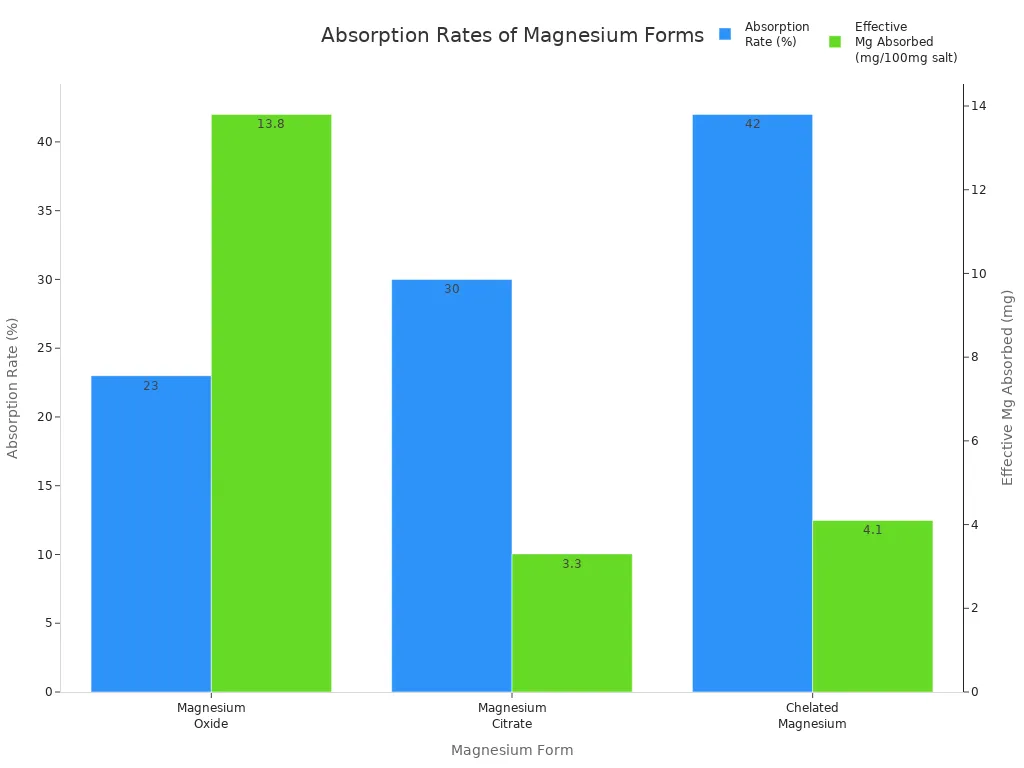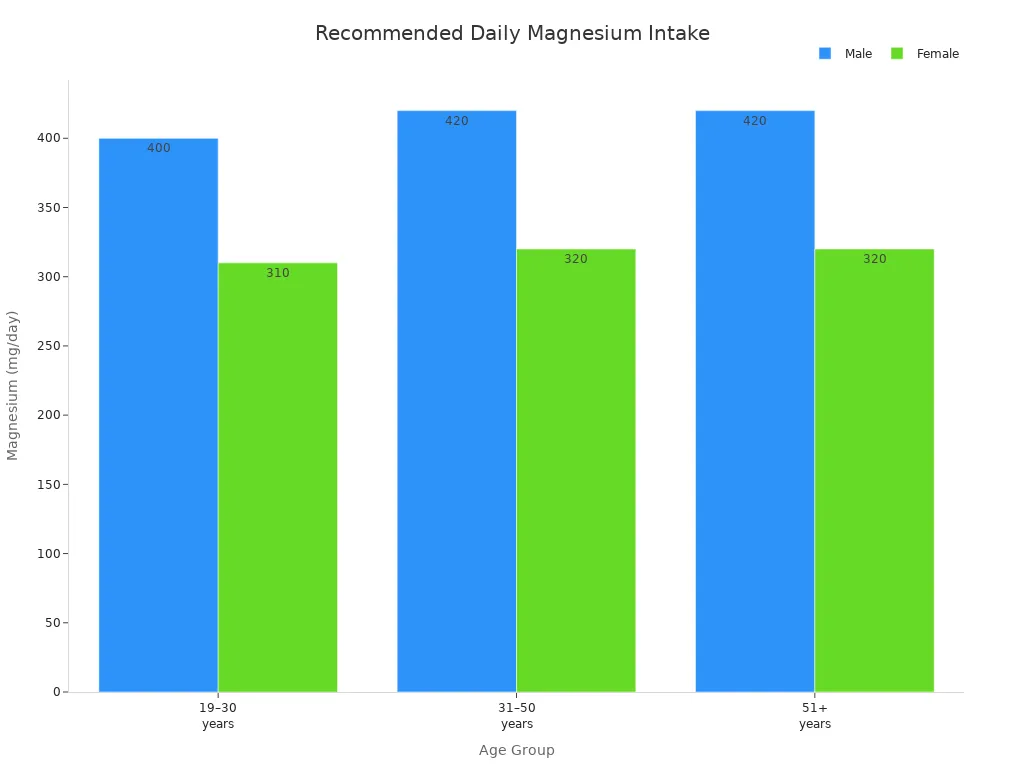What Chelated Magnesium Means for Your Health
Table of Contents

You might not realize how much chelated magnesium can influence your health. Chelated magnesium is a special form where magnesium binds to an amino acid or organic molecule, making it easier for your body to absorb. Many people do not get enough magnesium each day.
Studies show that 10% to 30% of adults worldwide have magnesium deficiency.
| Population Group | Prevalence of Magnesium Deficiency (%) |
|---|---|
| General population (various countries) | 5% – 30% |
| Young women (aged 18–22) | ~20% |
| Hospitalized elderly patients | >15% |
Choosing chelated magnesium can help you maintain healthy magnesium levels and support your daily wellness.
Chelated Magnesium Explained
What Is Chelation?
You may wonder what makes chelated magnesium different from other types of magnesium. Chelation is a chemical process where magnesium ions bond with organic molecules, such as amino acids or organic acids. This process forms a stable ring-like structure around the magnesium. The most common organic molecules used for chelation include glycine, taurine, citric acid, and malic acid. These molecules help keep magnesium stable and soluble as it moves through your digestive system.
| Organic Molecule Type | Examples Used to Chelate Magnesium in Supplements |
|---|---|
| Amino Acids | Glycine (magnesium bisglycinate), Taurine (magnesium taurate), Aspartic acid (magnesium aspartate), Threonine |
| Organic Acids | Citric acid (magnesium citrate), Malic acid (magnesium malate), Orotic acid (magnesium orotate) |
When you take chelated magnesium, the organic molecule acts like a protective shield. It prevents magnesium from binding with other substances in your gut that could block its absorption. This shield helps magnesium stay in a form your body can use. Scientists confirm that chelation involves magnesium attaching at several points on the organic molecule, making the bond strong and stable. This process keeps magnesium soluble and ready for your body to absorb.
Why Chelated Magnesium Absorbs Better
Your body needs magnesium for over 300 enzymatic reactions. These reactions help with energy production, protein synthesis, and DNA repair. Magnesium also supports muscle contraction, nerve function, and bone health. If you do not get enough magnesium, these important processes can slow down or stop working well.
Chelated magnesium stands out because your body absorbs it more efficiently than many other forms. The chelation process protects magnesium as it passes through your stomach and intestines. This protection means more magnesium reaches your bloodstream, making it a highly absorbable form. Clinical studies show that chelated magnesium, such as magnesium glycinate or magnesium malate, is better absorbed than non-chelated forms like magnesium oxide.
Tip: Chelated magnesium is gentle on your stomach and less likely to cause digestive upset compared to some other forms.
You can see how different magnesium forms compare in absorption and elemental content:

| Magnesium Form | Elemental Magnesium Content (%) | Absorption Rate (%) | Effective Magnesium Absorbed (per 100 mg salt) |
|---|---|---|---|
| Magnesium Oxide | ~60% | ~23% | ~13.8 mg |
| Magnesium Citrate | ~11% | ~30% | ~3.3 mg |
| Chelated Magnesium (e.g., aspartate, lactate) | ~8-14% | ~42% | ~3.2-5 mg |
Although magnesium oxide contains more elemental magnesium, your body absorbs a smaller percentage. Chelated magnesium offers a balance between absorption rate and elemental content, making it a smart choice for daily use.
Magnesium’s role in your health goes beyond just absorption. It acts as a cofactor for hundreds of enzymes. These enzymes help your body make energy, build proteins, and repair DNA. Magnesium also helps your muscles contract and relax, keeps your bones strong, and supports your nervous system. Studies show that chelated magnesium can improve muscle strength, reduce soreness, and support bone mineralization. It even helps protect your DNA from damage.
- Magnesium supports:
- Muscle power and recovery
- Bone density and strength
- DNA synthesis and repair
- Energy production
- Nerve function
When you choose chelated magnesium, you give your body a form that is better absorbed and easier to use. This choice helps you maintain healthy levels of magnesium, which supports your overall wellness and nutrient absorption.
Comparing Magnesium Forms
Chelated vs. Non-Chelated
When you shop for a magnesium supplement, you will see many different types. Each form has unique properties and effects on your body. Here are the most common magnesium supplements you may find:
- Magnesium Citrate – Often used for constipation and has high bioavailability.
- Magnesium Oxide – Contains a lot of magnesium but is poorly absorbed.
- Magnesium Glycinate – A chelated magnesium, gentle on your stomach and supports sleep.
- Magnesium Chloride – Well absorbed and available in oral and topical forms.
- Magnesium Sulfate – Known as Epsom salt, used for baths and medical treatments.
- Magnesium Lactate – Well absorbed and easy on digestion.
- Magnesium Malate – Used for muscle pain and fatigue.
- Magnesium Hydroxide – Common in antacids and laxatives.
- Magnesium Carbonate – Used in supplements and as a food additive.
- Magnesium Taurate – May help with blood pressure, sleep, and digestion.
You may notice that chelated magnesium, such as magnesium glycinate or magnesium malate, is often recommended for daily use. These forms are magnesium bonded to amino acids or organic acids, which makes them better absorbed and gentler on your digestive system.
Absorption and Digestive Comfort
Magnesium absorption varies depending on the type of supplement you choose. You can see the difference in absorption rates in the table below:
| Magnesium Form | Absorption Rate (%) | Notes on Bioavailability and Clinical Evidence |
|---|---|---|
| Magnesium Oxide | ~4 | Poor absorption, often used for digestive issues. |
| Magnesium Glycinate | 18.8 | Chelated magnesium, better absorbed, gentle on stomach. |
| Magnesium Citrate | Higher than oxide | Well absorbed, but may cause digestive upset at high doses. |
Non-chelated magnesium supplements, such as magnesium oxide and magnesium citrate, often cause digestive side effects. You may experience stomach upset, nausea, or diarrhea, especially with higher doses. These side effects happen because some forms act as laxatives.
Tip: Chelated magnesium, like magnesium glycinate, is less likely to cause cramping or diarrhea. It is a good choice if you have a sensitive stomach or want to avoid digestive discomfort.
Chelated magnesium stands out for its gentle effect on your digestive system. The bond with amino acids or organic acids helps your body absorb magnesium more efficiently and reduces the risk of stomach problems. You can support your wellness and avoid common digestive issues by choosing a chelated magnesium supplement.
Health Benefits

Better Absorption
You want your body to get the most from any supplement you take. Chelated magnesium stands out because your body absorbs it more efficiently than many other forms. Clinical studies show that chelated magnesium, such as magnesium diglycinate, provides higher absorption rates compared to non-chelated forms like magnesium oxide. For example, a double-blind trial with patients who had trouble absorbing nutrients found that magnesium diglycinate had an absorption rate of 23.5%, while magnesium oxide only reached 11.8%. This means you get more usable magnesium from each dose. Other studies confirm that chelated forms like magnesium aspartate can reach absorption rates up to 70%, much higher than what you get from food alone.
This improved absorption happens because chelated magnesium forms a stable ring with amino acids or organic acids. This structure protects the mineral as it moves through your digestive system. Your body can then use magnesium to activate over 300 enzymes. These enzymes help with energy production, protein building, and DNA repair. Magnesium also supports calcium metabolism by competing with calcium for binding sites in your cells. This balance keeps your muscles, nerves, and bones working well.
When you choose chelated magnesium, you help your body use magnesium more effectively. This supports your overall wellness and helps you avoid common problems linked to low magnesium.
Support for Sleep and Relaxation
Many people look for ways to improve their sleep and feel more relaxed. Magnesium plays a key role in calming the nervous system. It helps regulate neurotransmitters and hormones that control your sleep cycle. Studies with older adults and young people show that higher magnesium intake is linked to better sleep quality and longer sleep duration. Some research even connects magnesium to fewer sleep problems, like snoring and daytime sleepiness.
| Study Type | Population | Outcome/Findings |
|---|---|---|
| Randomized Controlled Trials | Older adults | Some trials show improved sleep quality and duration; others show mixed results |
| Observational Cohort Study | Young adults | Higher magnesium intake linked to recommended sleep duration and better subjective sleep quality |
| Mechanistic Studies | Animal/biochemical | Magnesium supports neurotransmitter balance and hormone production for sleep regulation |
Magnesium also helps lower cortisol, the main stress hormone. High cortisol can make you feel anxious and disrupt your sleep. By balancing neurotransmitters and hormones, magnesium creates calming effects in your brain and body. Research shows that chelated magnesium, because of its better absorption, can help reduce anxiety and promote relaxation. This makes it easier for you to unwind at night and fall asleep.
Many people notice that taking chelated magnesium in the evening helps them relax and sleep better. Its calming effects support both your mind and body.
Heart, Nerve, and Muscle Health
Magnesium is essential for your heart, nerves, and muscles. It helps control blood pressure, keeps your heartbeat steady, and supports healthy blood vessels. Studies show that people with low magnesium levels have a higher risk of heart problems. Chelated magnesium, especially forms like magnesium taurate, is better absorbed and tolerated. This means you can support your cardiovascular health without unwanted side effects like diarrhea.
- Magnesium supports over 300 enzymatic reactions, including those that:
- Regulate blood pressure
- Improve blood vessel function
- Lower the risk of cardiovascular events
Magnesium acts as a natural calcium channel blocker. It helps relax blood vessels and lowers blood pressure. Clinical studies show that magnesium supplements can reduce systolic blood pressure by up to 5.6 mm Hg. Combining magnesium with potassium and a low-sodium diet can further improve these effects.
Your muscles and nerves also depend on magnesium. It stabilizes energy molecules like ATP, which your muscles need to contract and relax. Magnesium keeps the balance of calcium, potassium, and sodium in your muscle cells. This prevents cramps, fatigue, and irregular heartbeats. Clinical trials show that chelated magnesium can improve muscle strength, power, and recovery. It also protects your nerves by blocking harmful calcium entry and reducing inflammation. This helps your nerves heal and function better.
Magnesium also plays a role in blood sugar control and mood. Studies with people who have type 2 diabetes show that magnesium supplements can lower blood sugar and improve insulin sensitivity. Magnesium helps your brain produce chemicals like serotonin, which lifts your mood and reduces anxiety. Many people find that regular magnesium intake improves their mood and helps them handle stress.
Pregnant women may wonder about magnesium’s role in maternal and fetal health. Some studies suggest that magnesium can help prevent muscle cramps, support hydration, and reduce the risk of premature contractions. However, large trials do not show clear benefits for all pregnancy outcomes. Magnesium sulfate, given by IV, can help prevent serious complications like preeclampsia, but routine oral supplementation with chelated magnesium does not have strong evidence for improving pregnancy outcomes.
Chelated magnesium is gentle on your stomach. It rarely causes digestive upset, making it suitable for daily use. You can take it regularly to support your heart, muscles, nerves, and overall wellness.
Using Chelated Magnesium
How to Choose Supplements
You want to make sure you pick a high-quality magnesium supplement for the best results. Start by checking the label for the specific form of magnesium. Look for names like “Magnesium (as Bisglycinate)” or “Magnesium (from Glycinate).” These show you are getting a chelated form, which absorbs well and is gentle on your stomach. The label should list the amount of elemental magnesium, not just the total compound weight. Some brands blend non-chelated forms with glycine and call it magnesium glycinate, but this does not offer the same benefits.
A high-quality magnesium supplement will have clear labeling and avoid unnecessary fillers or artificial colors. You should see third-party testing seals from groups like USP, NSF, or ConsumerLab. These show the product meets safety and purity standards. Patented ingredients, such as TRAACS Albion Magnesium Glycinate, indicate research-backed quality. Always check that the side panel matches the front label and that the product follows Good Manufacturing Practices (GMP).
Tip: Choose supplements with transparent ingredient lists and avoid products with magnesium oxide or carbonate as the main source.
Dosage and Timing
You need the right dose of magnesium to support your health. Health authorities recommend that adult men get 400–420 mg of elemental magnesium each day. Adult women need 310–320 mg daily. Pregnant women should aim for 350–360 mg, and lactating women need 310–320 mg. The safe upper limit for magnesium from supplements is 350 mg per day. Taking more can cause side effects like diarrhea or cramping.

If you want better sleep, take magnesium about one hour before bedtime. This timing helps your body relax and supports healthy sleep cycles. Chelated forms, such as magnesium glycinate, work well for sleep because they boost calming neurotransmitters like GABA. Always follow the dosage on the label and talk to your doctor if you have kidney problems or take other medicines. Store your supplement at room temperature and keep it away from moisture.
Note: Never double your dose if you miss one. Take it as soon as you remember, unless it is almost time for your next dose.
You support your heart, muscles, and nerves when you keep your magnesium levels balanced. Magnesium helps your body relax, sleep well, and feel calm. Many people choose magnesium glycinate or citrate because these forms absorb well and cause fewer stomach problems.
- Look for trusted brands with third-party testing.
- Start with 200–250 mg daily and adjust as needed.
Remember, talk to your doctor before starting any new supplement. Making informed choices helps you stay healthy and confident.
FAQ
What is the best time to take chelated magnesium?
You can take chelated magnesium at any time. Many people prefer taking it in the evening to help with sleep and relaxation. Always follow the instructions on your supplement label.
Can you take magnesium with other vitamins?
Yes, you can take magnesium with most vitamins. It works well with vitamin D and calcium. If you take many supplements, space them out to help your body absorb each one.
Does chelated magnesium cause side effects?
Chelated magnesium is gentle on your stomach. You are less likely to have side effects like diarrhea or cramps. If you take too much, you may still feel some discomfort.
How do you know if you need a magnesium supplement?
You may need a magnesium supplement if you feel tired, have muscle cramps, or sleep poorly. A doctor can check your levels with a blood test.

Poseidon
Master of Nutritional Epidemiology, University of Copenhagen, Herbal Functional Nutrition Researcher
Focus: The scientific application of natural active ingredients such as Tongo Ali, Horny Goat Weed, and Maca to sexual health and metabolic regulation.
Core Focus:
Men: Use a combination of Tongo Ali (an energizing factor) + Maca (an energy reserve) to improve low energy and fluctuating libido.
Women: Use a combination of Horny Goat Weed (a gentle regulator) + Maca (a nutritional synergist) to alleviate low libido and hormonal imbalances.
Stressed/Middle-Aged Adults: This triple-ingredient synergy supports metabolism, physical strength, and intimacy.
Product Concept:
Based on traditional applications and modern research (e.g., Tongo Ali promotes testosterone-enhancing enzyme activity, and icariin provides gentle regulation), we preserve core active ingredients and eschew conceptual packaging—using natural ingredients to address specific needs.
Simply put: I'm a nutritionist who understands "herbal actives." I use scientifically proven ingredients like Tongo Ali, Epimedium, and Maca to help you make "sexual health" and "nutritional support" a daily routine.
